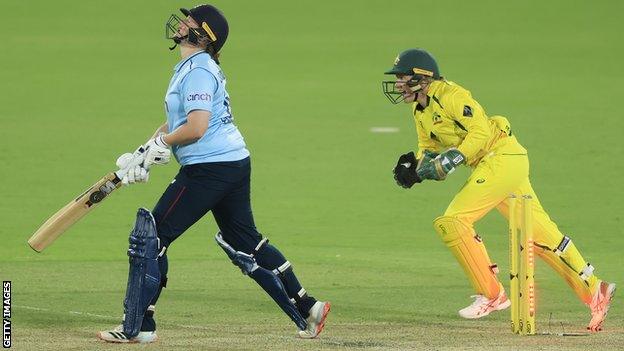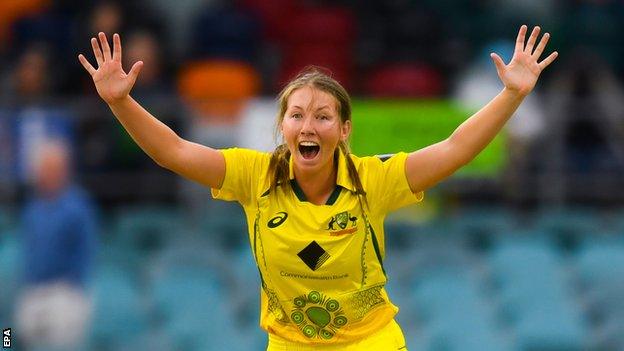Women's Ashes: Are England getting closer to Australia despite hosts retaining the trophy?
- Published

England trail the multi-format series 8-4 after defeat in the first ODI
It's a familiar feeling.
For the second time this winter Australia have beaten England to retain the Ashes with two matches to play.
Heather Knight's side have of course posed more of a challenge to their hosts in the Women's Ashes than England's men did during their crushing defeat.
And they still have the chance of drawing the multi-format series 8-8 if they win the final two one-day internationals.
After losing the first ODI by 27 runs, Knight said her side are "really not that far away" from Australia.
But England have now failed to win four Women's Ashes in a row - are they getting closer to their rivals?
Mentality
England have improved since the last Women's Ashes in 2019, when they were thrashed 12-4, although two more defeats could see them lose this series by the same margin.
Former Australia coach Lisa Keightley took over after World Cup-winning coach Mark Robinson stepped down and said she was confident of catching her native country.
England do look more confident, as the manner in which they set about chasing a record 257 to win the one-off Test only to fall short in an incredible draw shows, but Knight says they still need to be more ruthless.
"We've gone toe to toe with them," she said.
"We believe we're good enough to beat them, we just haven't quite had the killer instinct to get over the line."
Former England spinner Alex Hartley told Test Match Special that Knight's team "are not far behind" Australia.
"In 2019 they were overawed but they've not been here," she added.
England's preparation for the series was branded "comical" by Knight because of Covid-19 rules, while the second and third Twenty20s were washed out.
But Knight makes no excuses, saying: "We've had enough prep now and we're in a position to be successful."
Execution
Knight said her side "haven't been able to string batting and bowling together in a complete performance" yet.
Australia certainly are still more assured in how they execute their skills with bat and ball.
In the first T20, England posted a challenging 169-4, but were ragged with the ball and in the field as Australia comfortably won by nine wickets and with 18 balls to spare.
England needed 45 runs from 60 balls with seven wickets left in the Test, but poor shot selection saw them collapse and have to hang on for a dramatic draw.
Then after restricting Australia to a below-par total in the first ODI, England's batting subsided against accurate but not unplayable bowling.
"It was disappointing - anything straight was difficult to play but England couldn't capitalise on anything short and wide either and threw their wickets away," said former Australia leg-spinner Kristen Beams.
Depth

Australia pace bowler Darcie Brown already looks an assured international player at 18-years-old
The long-term financial investment in women's cricket in Australia and the quality of the Women's Big Bash League has given the national side a strength in depth that far surpasses any other country.
The quality of their many options has been evident in this series and will concern England for their upcoming 50-over World Cup defence and future Ashes series.
In the first T20, Tahlia McGrath took 3-26 and hit 91 not out off 49 balls after Australia left out star all-rounder Ellyse Perry.
The hosts have been without first-choice leg-spinner Georgia Wareham throughout because of injury, while seamer Megan Schutt missed the Test, but replacements Alana King and Annabel Sutherland nearly bowled Australia to victory in that match.
Ashleigh Gardner is Australia's women's cricketer of the year, but bats at number seven below a world-class top six.
And 18-year-old Darcie Brown, who took 4-34 in the first ODI, has been a constant threat after coming in for the injured Tayla Vlaeminck.
England will hope investment that has increased the number of women's professional players to 67, external and the development of The Hundred will help close the gap before long.
England have promising young players in and around their set-up including batter Sophia Dunkley, all-rounder Charlie Dean, spin trio Sophie Ecclestone, Sarah Glenn and Mady Villiers and seamers Lauren Bell and Izzy Wong - all of whom are 23 or under.
But they need them to kick on and for more young talent to come through - seven of England's Ashes squad are aged 30 or over, compared to only three of Australia's.

Watch the trailer for Chloe: A twisted psychological thriller uncovering the dark side of our obsession with social media
Why Ships Crash: The definitive story of how the Suez Canal crisis triggered global panic
